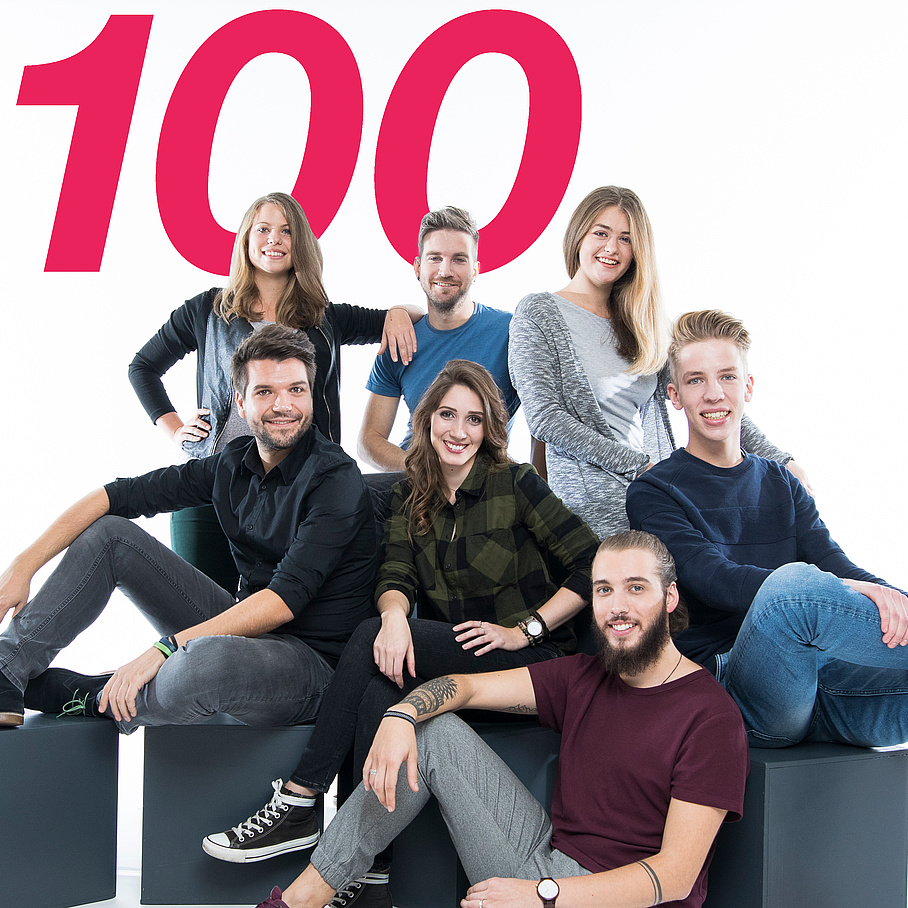Quick Facts
- Duration of study: 4 semesters
- ECTS credit points: 120
- Academic degree:
Diplom-Ingenieurin
orDiplom-Ingenieur
(Dipl.Ing. or DI), equivalent to the Master of Science (MSc) - Language of instruction: English
The Master's Programme
In the master's degree programme, you will learn about principles, methods and tools for the production, development and application of complex software systems. You will learn to maintain an overview of the entire process, which extends from identifying requirements to commissioning and maintaining an IT solution. Other factors also play important roles in this process, including providing reliable software in a timely manner, fulfilling quality criteria and precisely calculating costs. In order to consider all these factors, you will learn how to successfully apply methods in practical IT and management tools.
The master's programme Software Engineering and Management differs from other degree programmes in the IT sector in that it is very practice-oriented and strongly integrates the economic component.
You have the opportunity to participate in research and industrial projects during the course of your studies. You can tackle tasks such as the use of drones to deliver parcels, the development of games (games engineering), or the detection chip errors. You make contributions in the form of the conception, programming, or development of algorithms.
Students have access to excellent research infrastructure, including
- Computer Vision labs,
- Virtual Reality labs: DAVE,
- Smart fitting rooms for the development of virtual worlds,
- Extensive computing infrastructure for machine learning and data science and
- Human-Computer Interaction lab.
Play video
Choose from many different majors and minors.
Focus Areas
Students have a great deal of freedom when choosing court content. The master's degree programme Software Engineering and Management consists of a major subject (major) from Software Engineering, a minor subject (minor) from Management, an elective, a free-choice subject and a master’s thesis.
You can specialise still further in the following focal areas:
Algorithms and Theoretical Computer Science (major): You learn the fundamentals of probability and information theory. In addition, you become familiar with the most important problems and algorithmic approaches used in combinatorial optimisation to solve these and acquire in-depth knowledge of discrete geometric structures.
Data Science (major): You learn how to perform data mining and become familiar with the architecture of modern machine learning systems. For example, you perform statistical analyses on large amounts of data.
Games Engineering (major): You acquire both fundamental and more detailed knowledge about game development, game design, real-time graphics and simulation and animation techniques. You can develop an initial game prototype.
Information Security (major): You learn more about the challenge inherent in making the digital world more secure and, for example, how to create secure systems such as ATM cards or chips. You focus on practical aspects related to applying and using security mechanisms and understand the principles underlying these mechanisms.
Intelligent Systems (major: You deepen your knowledge in the field of artificial intelligence and learn more about knowledge representation and inference methods. Furthermore, you familiarise yourself with natural language processing and intelligent user interfaces. You learn how to identify the correct approach to use to solve problems and to design and apply user interfaces.
Interactive and Visual Information Systems (major): You explore the design, development and evaluation of user-based information systems. You also learn, for example, technologies that can be used for data representation, navigation and presentation. In addition, you familiarise yourself with web technologies and evaluation methods.
Machine Learning (major): You learn fundamental mathematical skills and how to use machine and autonomous learning. You also take a closer look at methods used for deep learning and reinforcement learning.
Robotics ( major): You learn which methods can be used to develop intelligent robots and systems. In addition to acquiring basic theoretical knowledge about navigation, computer vision, machine learning, knowledge representation, decision-making, or speech comprehension, you also acquire the ability to design, apply and validate intelligent systems.
Software Technology (major): You explore advanced techniques that are relevant to the development of complex and critical software. These include analysis, design, validation and verification techniques. Furthermore, you learn how to apply artificial intelligence techniques to software engineering. You also become familiar with programming languages and compiler construction.
Visual Computing (major): You learn about computer graphics, image processing, geometric modelling, virtual and augmented reality and information visualisation. In addition to mastering the theoretical basics in these areas, you will learn how to apply these in practice. The areas of application range from medicine to industrial automation.
Business Informatics (minor): You learn more about modern business information systems, such as systems for enterprise resource planning (ERP) or supply chain management (SCM), and can identify potential areas of application. You learn to actively participate in IT implementation projects.
Industrial Management and Innovation (minor): You gain insight into the management of innovations, production and logistics and familiarise yourself with the principles of industrial management. You learn fundamental methods that enable you to develop products successfully, beginning with the product idea conception and extending through product development and on to product marketing.
Management and Strategy (minor): You learn how companies develop strategies and develop their organisation. You also learn about information systems and their relevance in corporate strategy. You familiarise yourself with corporate management concepts and learn how to apply them in practice.
Management Control, Accounting and Finance (minor): You become familiar with central financial management instruments and learn how to assure the economic success of companies and make them attractive to investors. In addition, you acquire the ability to act as a competent mediator between the companies and the external world of finance.
Current Societies (minor): You become familiar with fundamental sociological concepts, problems and perspectives and the history of empirical social research. You will learn about the social relevance of sociological thinking and the different approaches to apply this practice.
Cognition and Behaviour (minor): You learn about general topics in psychology, such as perception, emotion and motivation, as well as neuropsychology and cognitive neuroscience. Furthermore, you learn more about industrial and organisational psychology and address topics such as leadership, teamwork, or communication within organisations.
Digital Entrepreneurship (minor): You get a feeling for entrepreneurial thinking and acting
and gain a good understanding of customer orientation. You tackle questions regarding how to found a company and learn how to systematically drive innovation in the course Entrepreneurial Management
.
Business Law (minor): You learn about the data protection law from the perspective of IT professions and learn how to manage personal data responsibly in business life.
Collaborations and Networks
Students benefit from accessing the teaching staff’s research network and can conduct thesis work at top universities, such as RWTH Aachen, ETH Zurich, or Stanford University. In addition, visiting international professors regularly provide insights into their research.
It is possible to conduct research and industrial projects with regional cooperation partners such as AVL, Magna or Infineon, providing insights into practical applications. Support is also provided for master's thesis work in cooperation with local industry partners and for stays abroad. Students even have the opportunity to follow up on their master’s thesis by performing specialised dissertation research.
Admission
The prerequisite for admission is a completed bachelor’s degree in a relevant subject (see curriculum).
Additionally, you need to provide evidence of competence in the English language.
1. Admission Procedure
Admission without admission procedure
The following categories of applicants are eligible for the master’s programme without an admissions procedure:
1. Graduates of the following bachelor’s programmes at TU Graz:
2. Graduates of the following Bachelor’s programmes at other universities:
Graduates of all other degree programmes offered at the TU Graz can apply for admission at the Registrar's Office without an admission procedure.
Admission with admission procedure
Graduates of a previous study programme not mentioned above undergo an admission procedure.
Registration for the academic year 2026/27: 15 October to 15 December 2025
You can complete the admission procedure before the end of your bachelor’s studies.
Please do not send any documents by post!
2. Admission
- Admission and deadlines for international students
- Admission and deadlines for Austrian students who are registering to study at TU Graz for the first time
If you have already been admitted to a degree programme at TU Graz, or have studied at TU Graz before, please come to the Registrar's Office in person to complete your admission during the admission period.
Fragen zur Zulassung?
Contact study@tugraz.at
Career Prospects

Our national and international industrial partners are constantly looking for good software developers. Through the programme Software Engineering and Management, students acquire both in-depth technical expertise in software development and industry expertise in management. Graduates with these useful skills represent highly qualified professionals in the industry.
Professional Fields
Graduates of the degree programme have both abstract and interdisciplinary thinking skills. They have extensive knowledge in the fields of software development and management. As a result, these graduates are in great demand in industry, services, public administration, business, education and science.
Graduates of this degree programme
- develop high-quality, powerful software systems,
- take on leading positions in management,
- develop technologies and information flows, or
- work as software developers, project managers, or business developers.



